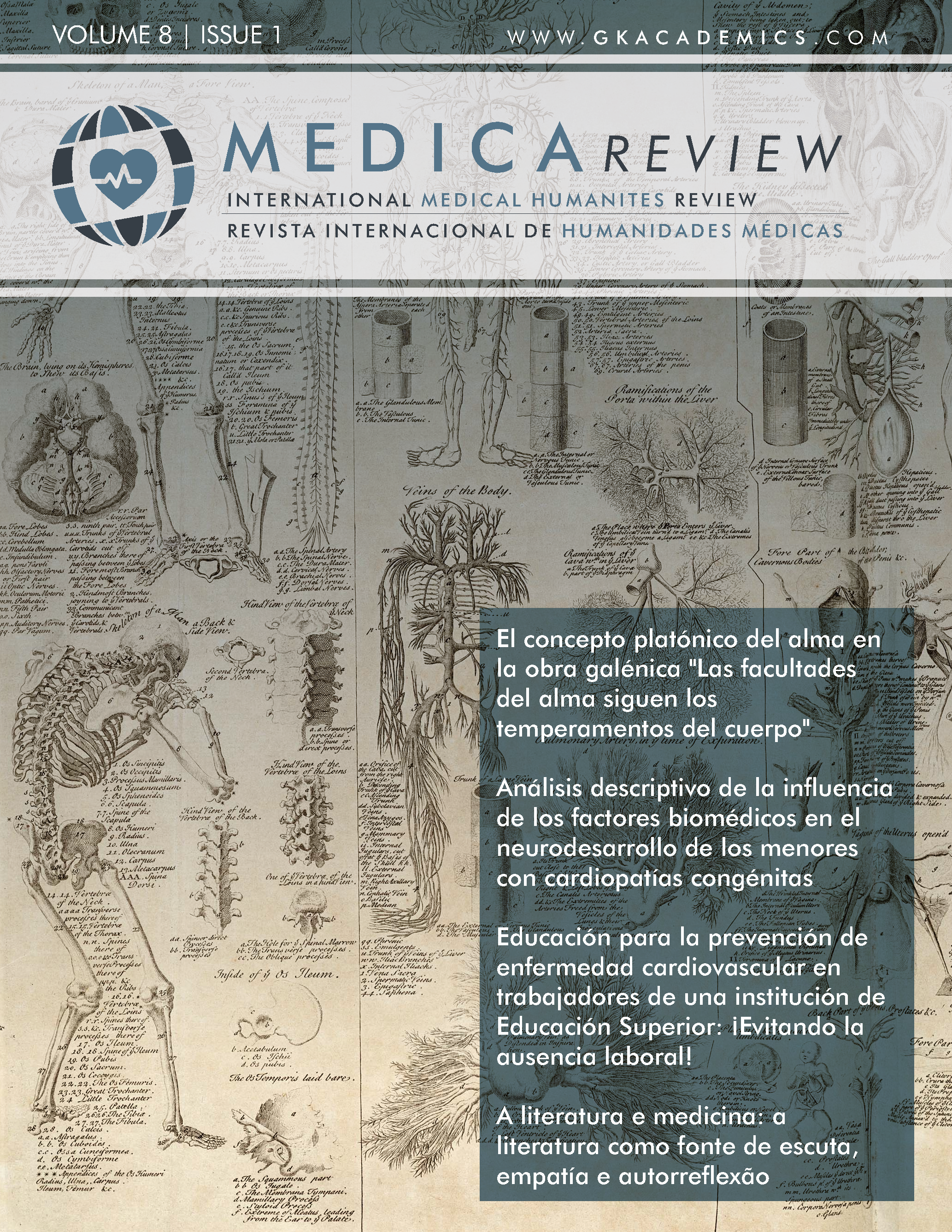A literatura e medicina: a literatura como fonte de escuta, empatía e autorreflexão
DOI:
https://doi.org/10.37467/gka-revmedica.v8.2234Palavras-chave:
Humanidades Médicas, Medicina Narrativa, Escuta médica, Empatia, Autorreflexão, Auto-cuidado médicoResumo
Os tempos modernos trouxeram avanços na compreensão das doenças, novos recursos diagnósticos e terapêuticos e o uso revolucionário da tecnologia, permitindo o progresso da medicina. Para abarcar a complexidade do progresso das evidências científicas a formação médica tem reforçado e privilegiado o conhecimento científico. O investimento na formação de habilidades humanísticas, de linguagem, comunicação, capacidade de escuta e empatia não se equiparou à formação técnica. Tal desequilíbrio tem mostrado prejuízos na capacidade do médico moderno escutar com atenção, compreender globalmente e se relacionar adequadamente com seus doentes. Apesar disto, iniciativas de fomento à uma medicina humana e integral tem surgido e sido mantidas nas escolas médicas.
Referências
Adler, J. M. (2013). Como falar, como ouvir. São Paulo: É Realizações.
Appel, M. & Malečkar, B. (2012). The Influence of Paratext on Narrative Persuasion: Fact, Fiction, or Fake? Human Communication Research, 38(4), 459–484. https://doi.org/10.1111/j.1468-2958.2012.01432.x DOI: https://doi.org/10.1111/j.1468-2958.2012.01432.x
Batt-Rawden, S. A., Chisolm, M. S., Anton, B., & Flickinger, T. E. (2013). Teaching empathy to medical students: An updated, systematic review. Academic Medicine, 88(8), pp. 1171–1177. https://doi.org/10.1097/ACM.0b013e318299f3e3 DOI: https://doi.org/10.1097/ACM.0b013e318299f3e3
Beckman, H. B. & Frankel, R. M. (1984). The effect of physician behavior on the collection of data. Annals of Internal Medicine, 101(5), 692–696. https://doi.org/10.7326/0003-4819-101-5-692 DOI: https://doi.org/10.7326/0003-4819-101-5-692
Broyard, A. (1993). Intoxicated by my illness and others writings on life and death. New York: Fawcett Columbine.
Candido, A. (2011). Vários escritos. Rio de Janeiro: Ouro sobre Azul.
Charon, R. (2001). Narrative medicine: A model for empathy, reflection, profession, and trust. Journal of the American Medical Association, 286(15), pp. 1897–1902. https://doi.org/10.1001/jama.286.15.1897 DOI: https://doi.org/10.1001/jama.286.15.1897
Charon, R. (2007). What to do with stories: The sciences of narrative medicine. Canadian Family Physician, 53(8), pp. 1265–1267.
Charon, R. (2013). Narrative medicine in the international education of physicians. Presse Medicale, 42(1), pp. 3–5. https://doi.org/10.1016/j.lpm.2012.10.015 DOI: https://doi.org/10.1016/j.lpm.2012.10.015
Charon, R. (2015). O corpo que se conta - porque a medicina e as histórias precisam uma da outra. São Paulo: Letra e Voz.
Djikic, M., Oatley, K. & Moldoveanu, M. C. (2013). Reading other minds: Effects of literature on empathy. Scientific Study of Literature, 3(1), 28–47. https://doi.org/10.1075/ssol.3.1.06dji DOI: https://doi.org/10.1075/ssol.3.1.06dji
Ferreira, E. M. A. (2014). A escuta sensível das narrativas médicas. Intersemiose, 5, 78–98.
Frich, J. C. & Jørgensen, J. (2000). Medicine and literature-interpretation and discussion of literary texts in medical education. Tidsskrift for Den Norske Laegeforening : Tidsskrift for Praktisk Medicin, Ny Raekke, 120(10), pp. 1160–1164. http://www.ncbi.nlm.nih.gov/pubmed/10863345
Gallian, D. (2017). A literatura como remédio: os clássicos e a saúde da alma. São Paulo: Martins Claret.
Gleichgerrcht, E., & Decety, J. (2014). The relationship between different facets of empathy, pain perception and compassion fatigue among physicians. Frontiers in Behavioral Neuroscience, 8(july). https://doi.org/10.3389/fnbeh.2014.00243 DOI: https://doi.org/10.3389/fnbeh.2014.00243
Hampshire, A. J. & Avery, A. J. (2001). What can students learn from studying medicine in literature? Medical Education, 35(7), 687–690. https://doi.org/10.1046/j.1365-2923.2001.00969.x DOI: https://doi.org/10.1046/j.1365-2923.2001.00969.x
Hunter, K. M., Charon, R. & Coulehan, J. L. (1995). The Study of Literature in Medical Education. Acad Med, 70(9), 787–794. DOI: https://doi.org/10.1097/00001888-199509000-00016
Keen, S. (2006). A theory of narrative empathy. Narrative, 14(3), 207–236. https://doi.org/10.1353/nar.2006.0015 DOI: https://doi.org/10.1353/nar.2006.0015
Kidd, D. C. & Castano, E. (2013). Reading literary fiction improves theory of mind. Science, 342(6156), 377–380. https://doi.org/10.1126/science.1239918 DOI: https://doi.org/10.1126/science.1239918
Koopman, E. M. (E.). (2016). Effects of “literariness” on emotions and on empathy and reflection after reading. Psychology of Aesthetics, Creativity, and the Arts, 10(1), 82–98. https://doi.org/10.1037/aca0000041 DOI: https://doi.org/10.1037/aca0000041
Koopman, E. (2015). How texts about suffering trigger reflection: Genre, personal factors, and affective responses. Psychology of Aesthetics, Creativity, and the Arts, 9(4), 430–441. https://doi.org/10.1037/aca0000006 DOI: https://doi.org/10.1037/aca0000006
Koopman, E. & Hakemulder, F. (2015). Effects of Literature on Empathy and Self-Reflection: A Theoretical-Empirical Framework. Journal of Literary Theory, 9(1). https://doi.org/10.1515/jlt-2015-0005 DOI: https://doi.org/10.1515/jlt-2015-0005
Lancaster, T., Hart, R. & Gardner, S. (2002). Literature and medicine: Evaluating a special study module using the nominal group technique. Medical Education, 36(11), 1071–1076. https://doi.org/10.1046/j.1365-2923.2002.01325.x DOI: https://doi.org/10.1046/j.1365-2923.2002.01325.x
Mar, R. A., Oatley, K., Djikic, M., & Mullin, J. (2011). Emotion and narrative fiction: Interactive influences before, during, and after reading. Cognition and Emotion, 25(5), pp. 818–833. https://doi.org/10.1080/02699931.2010.515151 DOI: https://doi.org/10.1080/02699931.2010.515151
Mar, R. A., Oatley, K., & Peterson, J. B. (2009). Exploring the link between reading fiction and empathy: Ruling out individual differences and examining outcomes. Communications, 34(4), 407–428. https://doi.org/10.1515/COMM.2009.025 DOI: https://doi.org/10.1515/COMM.2009.025
Marvel, M. K., Epstein, R. M., Flowers, K., & Beckman, H. B. (1999). Soliciting the patient’s agenda: Have we improved? Journal of the American Medical Association, 281(3), 283–287. https://doi.org/10.1001/jama.281.3.283 DOI: https://doi.org/10.1001/jama.281.3.283
Neumann, M., Edelhäuser, F., Tauschel, D., Fischer, M. R., Wirtz, M., Woopen, C., Haramati, A., & Scheffer, C. (2011). Empathy decline and its reasons: A systematic review of studies with medical students and residents. Academic Medicine, 86(8), pp. 996–1009. https://doi.org/10.1097/ACM.0b013e318221e615 DOI: https://doi.org/10.1097/ACM.0b013e318221e615
Pino, M. C., & Mazza, M. (2016). The Use of “Literary Fiction” to Promote Mentalizing Ability. PLOS ONE, 11(8), e0160254. https://doi.org/10.1371/journal.pone.0160254 DOI: https://doi.org/10.1371/journal.pone.0160254
Ritivoi, A. D. (2018). Empatia, intersubjetividade e compreensão narrativa - lendo as histórias, lenda as vidas (dos outros). São Paulo: Letra e Voz.
Robinson, J. D., Tate, A., & Heritage, J. (2016). Agenda-setting revisited: When and how do primary-care physicians solicit patients’ additional concerns? Patient Education and Counseling, 99(5), 718–723. https://doi.org/10.1016/j.pec.2015.12.009 DOI: https://doi.org/10.1016/j.pec.2015.12.009
Rosa, G. (2012). Grande Sertão: Veredas. Rio de Janeiro: Nova Fronteira.
Scliar, M. (2013). Território da emoção: Crônicas de medicina e saúde. São Paulo: Companhia das Letras.
Shakir, M., Vannatta, J., & Schlefer, R. (2017). Effect of College Literature and Medicine on the Practice of Medicine. Journal of the Oklahoma State Medical Association, 110, 593–600.
Shapiro, J., Morrison, E. H., & Boker, J. R. (2004). Teaching empathy to first year medical students: Evaluation of an elective literature and medicine course. Education for Health, 17(1), 73–84. https://doi.org/10.1080/13576280310001656196 DOI: https://doi.org/10.1080/13576280310001656196
Stepien, K. A., & Baernstein, A. (2006). Educating for empathy: A review. Journal of General Internal Medicine, 21(5), pp. 524–530. https://doi.org/10.1111/j.1525-1497.2006.00443.x DOI: https://doi.org/10.1111/j.1525-1497.2006.00443.x
Street, R. L., Gordon, H., & Haidet, P. (2007). Physicians’ communication and perceptions of patients: Is it how they look, how they talk, or is it just the doctor? Social Science and Medicine, 65(3), 586–598. https://doi.org/10.1016/j.socscimed.2007.03.036 DOI: https://doi.org/10.1016/j.socscimed.2007.03.036
Tchekhov, A. (2014). O beijo e outras histórias. São Paulo: Editora 34.
Downloads
Publicado
Como Citar
Edição
Seção
Licença
Os autores/as que publicam nesta revista concordam com os seguintes termos:
- Os autores/as terão os direitos morais do trabalho e cederão para a revista os direitos comerciais.
- Um ano após a sua publicação, a versão do editor estará em acesso aberto no site da editora, mas a revista manterá o copyright da obra.
- No caso dos autores desejarem asignar uma licença aberta Creative Commons (CC), poderão a solicitar escrevendo a publishing@eagora.org.









